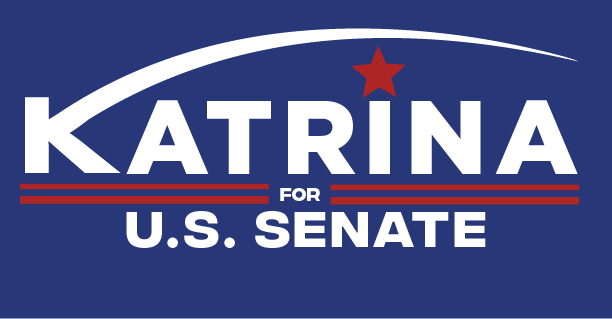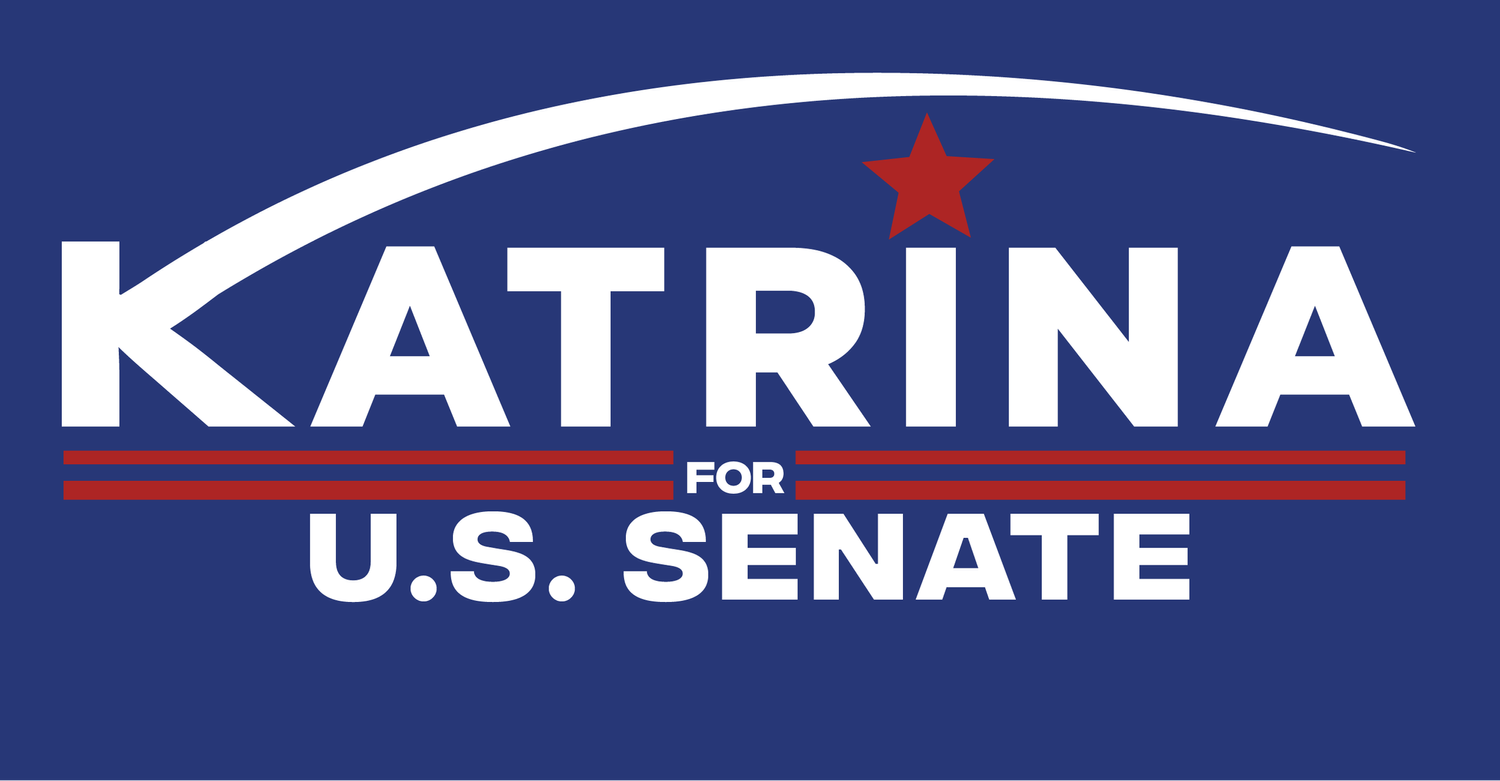Port: Democratic Senate Candidate Katrina Christiansen crosses the $1 million mark in fundraising
Published by The Forum | July 16, 2024
MINOT — North Dakota's federal candidates have filed their July quarterly financial reports, and they're fairly interesting.
U.S. Senate candidate Katrina Christiansen, who won the Democratic-NPL's nomination last month, is raising more money than any statewide Democratic candidate has in North Dakota since former Sen. Heidi Heitkamp was last on the ballot in 2018.
Though there are some asterisks.
The Senate campaigns
According to her July quarterly financial report filed with the Federal Election Commission, Christiansen raised $331,717.95 in net contributions between May 23 (the end of the pre-primary reporting period) and June 30.
That's actually more than the incumbent, Republican Sen. Kevin Cramer,raised in the reporting period (he came in at $296,333.36) and, with the dollars raised previously in this cycle, brings Christiansen to $1,154,051.80 total for the election cycle.
That's a big number for a candidate who, despite running for the Senate in 2022 as well, isn't exactly a household name in North Dakota. Keep in mind, when Christiansen ran in 2022, she raised less than $113,000 for the entire cycle.
But now, for the asterisks.
Christiansen is spending a lot of money to raise this money, which isn't leaving a lot left over to bring her message to voters. Christiansen didn't have an opponent in the June primary and the general election campaign hasn't begun in earnest yet. The candidate should be trying to build a stockpile of cash she can deploy to win over voters and get them to the ballot box.
Her cash reserves are growing. She ended the pre-primary reporting period with just a bit less than $110,000 in cash on hand. She ended the July quarterly period with just over $200,000 in cash on hand. That's progress, but the incumbent had over $3.29 million in cash as of June 30.
Cramer raised $296,333.36 in the July quarterly reporting period, and over $4.34 million so far in the 2024 election cycle.
Christiansen has out-raised Cramer in each of the last two reporting cycles, but I think it's fair to say that the incumbent hasn't exactly been trying. He has ample cash reserves to run an aggressive campaign against Christiansen and could undoubtedly raise millions more in short order should he get the sense that the challenger is gaining ground.
Still, North Dakota's Democrats, who haven't had much to cheer for in recent election cycles, should be feeling some optimism about Christiansen.
She's building up a donor network. She's raising her name ID. She may not be on a trajectory to win this cycle, but she is building a real foundation for future cycles, be it for herself or for another candidate to build on.
House campaigns
The most eyebrow-raising information from the U.S. House campaigns comes from failed Republican candidate Rick Becker's disclosure. The Friends of Rick Becker committee raised just over $71,000 down the stretch of the campaign (just over $24,000 after refunds), which is a pittance for a statewide candidate in a heated primary.
Becker is good at making a lot of noise, and certainly benefited from hundreds of thousands of dollars in independent spending from groups based in Washington, but he's yet to demonstrate that he has a network of in-state support that translates into a sustainable statewide campaign.
The candidate didn't exactly go for broke with the money he did raise, either. He ended the cycle with over $348,000 in cash on hand. Again, when you're a candidate trying to win a hotly contested primary, you empty the silos. Given that Becker loaned his campaign $550,000, I suspect he prioritized paying himself back over additional spending on winning the race.
By the way, the donation refunds appear to be from people who gave the maximum allowable donation to Becker for the entire election cycle. There's a cap at $3,300 for the primary part of the campaign and $3,300 for the general election portion. Some donors had to get refunds because Becker lost the primary and cannot campaign in the general.
Julie Fedorchak, who did win the Republican primary, raised over $369,000 during the reporting period, and over $1.34 million cycle-to-date. She's well positioned for the general election, ending the reporting period with over $264,000 in cash.
With all due respect to her opponent, I think Fedorchak's election to the U.S. House is on rails at this point.
Speaking of which, much like Christiansen, Hammer, Fedorchak's general election opponent, had a substantial fundraising period, as long as we add the "for a Democrat in North Dakota" disclaimer to the "substantial" description.
He raised over $172,000 in the reporting period and has banked over $554,000 in the cycle to date. As of June 30, his campaign had over $162,000 in cash.
Cara Mund didn't raise much money at all for her second run at the U.S. House. She raised less than $7,000 in the July quarterly period and just over $24,000 for the cycle. She spent roughly twice what she raised, too. Her total expenditures in the cycle were north of $43,000 and she ended the reporting period with less than $800 in cash on hand.
That Mund received roughly 19% of the vote is probably a testament to her name recognition (there's clearly a faction of voters who enjoy the novelty of a former Miss America running for a seat in Congress) and a certain amount of enthusiasm from Democratic voters who, inexplicably, think the path to success for their cause lays with organizing their meager numbers behind Mund.
A lot of people ask me if I believe Mund could run a third campaign for the House in two years (or some other elected office). She could, I suppose. She seems to love the attention, but I'm not sure I see a path for her at this point. She's chosen an approach — campaigning against popular Republicans as a Republican with visible support from Democrats — that seems almost calculated to irritate most Republicans and Democrats.
Alex Balazs, who was endorsed by the NDGOP state convention, raised less than $13,000 in the final reporting period of the primary, and just over $20,000 for the entire election cycle.
In the July quarterly reporting period, Balazs had just 10 individual contributions. Interestingly, one of them was a $1,000 contribution from former Lt. Gov. Brent Sanford, though I suspect that had something to do with Sanford's wife, Sandi, serving as the chair of the NDGOP. Balazs was the convention-endorsed candidate, and I suspect the Sanfords were making a show of supporting Balazs for that reason.
He ended the July quarterly reporting period with over $54,000 in cash on hand (he also loaned his campaign $113,000).
He'll be able to repay about half what he loaned his campaign.
What's the future for Balazs? I actually spoke with him over the weekend and asked him that question. "Paying off some campaign debt," is the first thing he said to me, while laughing. Beyond that, he said he isn't sure. "Local office just doesn't seem like the right fit for me," he said, expressing a desire for federal office, though he also didn't seem eager to take on the Republican incumbents who will almost certainly be in those offices.
In the 2026 cycle, only North Dakota's U.S. House seat will be on the ballot (and Fedorchak will likely be sitting in it). In 2028, it's the House seat and U.S. Sen. John Hoeven will be up for reelection as well. It's very possible that Hoeven won't seek another term in office at that point, so it could be an open race.
Sharlet Mohr, who was put on the primary ballot through petition signatures from Becker's supporters (a misguided attempt to dilute the Republican vote to Becker's advantage) didn't file a July quarterly. To date, Mohr hasn't filed any disclosures with the FEC, and she may not be required to. Candidates only have to register with the FEC once they've raised or spent in excess of $5,000.
Mohr was essentially a non-entity on the campaign trail, thus she probably didn't hit that threshold.
- Opinion by Rob Port


